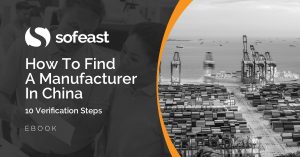I used to believe that Chinese manufacturers were great at sourcing their own materials/components. There are many reasons for this:
- They are based here and have teams who can go and visit local suppliers.
- They have extensive networks they can tap for suggestions.
- They consolidate buying power for many customers.
- They have mastered the art of selling to overseas companies. They know how to ‘make deals’.
And yet… After reviewing the way they manage their procurement, I have seen more mismanagement than maybe in any other function (production, quality, etc.).
I tried to analyze the main reasons behind this widespread problem.
1. Wrong objectives
1.1 Lowest unit price
There is a strong focus on getting a deal with the lowest price, rather than securing the lowest ‘total cost of ownership’. This has several implications that are highly detrimental to quality:
- The supplier agrees on a lower price in exchange for a higher quantity order. Much of that batch is kept in inventory and consumed by several orders. Do you think that supplier will accept to get the components back if the buyer detects a quality issue on 30% of the pieces 2 months after the transaction?
- The purchasers disregard the data from the incoming QC inspections (and routinely don’t even have such data in hand), so they select the supplier based on price alone.
1.2 Pleasing the owner’s network
Many business decisions are taken on the basis of non-economic factors. This is true everywhere, including in China.
Every factory owner is part of a close network of friends, usually from the same hometown. And, obviously, family ties matter a great deal, too.
If a cousin, or a good buddy, make a certain type of material, they automatically become the sole supplier. It is a no-brainer. The difference in price from the best competitor might be 5% at the start, and then go up to 15% gradually. And it doesn’t matter. To even discuss with that best competitor is seen as rude.
Oh, and what happens when bad components are received from that “special” supplier? They can’t be rejected, or that other party would lose face. They have to be used for production. Too bad for the customer.
(I am generalizing a bad behavior I have seen more than a few times, but I am absolutely not exaggerating.)
2. Wrong incentives
2.1 Purchasers and hidden commissions
It is a well-known fact that people who screen and select suppliers often get a commission ‘under the table’. A Chinese component supplier routinely asks “what is your commission, so that I know what price to offer?”
(Here I am definitely not over-generalizing. A totally honest purchaser, who has decision-making power but doesn’t use it for personal enrichment, is a rare bird in China.)
In many small and midsize factories, there is no centralized database of suppliers, parts, and purchasing prices. That’s right, the boss can’t even retrieve the Bill Of Materials (BOM) of a product they make!
Why do purchasers keep that information to themselves? To ensure a lack of visibility. No visibility means no audits from management, which means a low risk of getting caught.
In the end, this means both higher pricing and a suboptimal choice of suppliers.
2.2 Hiding information from customers
Another very annoying trait of many Chinese business people is their desire of keeping information close to the vest. They see transparency as a very bad thing.
Here is the typical reasoning. A factory buys components, assembles them and packs them, and ships them out to a foreign company. The source of those components needs to be kept secret. Otherwise, the buyer can do 2 things:
- Have a rough guess at the assembly factory’s margin.
- Go to another factory, give the list of suppliers, and ask for a competitive quote. It makes it too easy for competitors!
What the typical supplier wants to avoid is questions like “you are not doing a good job, and yet you capture a profit of 15%; please tell me why I shouldn’t switch to a competitor of yours who can supply the exact same product for 10% less.”
—
Does it make sense? Have you noticed the same issues?
Are you trying to find a manufacturer in China who is well-suited to your needs and can also deliver on their promises?
Sofeast has developed 10 verification steps to help importers find the right manufacturing partner in China. They’re shared in this FREE eBook: “How To Find A Manufacturer In China: 10 Verification Steps.”
It covers:
- Background checks
- Manufacturing capabilities
- Quality system auditing
- Engineering resources
- Pricing, negotiation, & contracts
- …and much, much more
Just hit the button below to get your copy and put yourself in a great position to get better results from Chinese manufacturers who supply your products:

